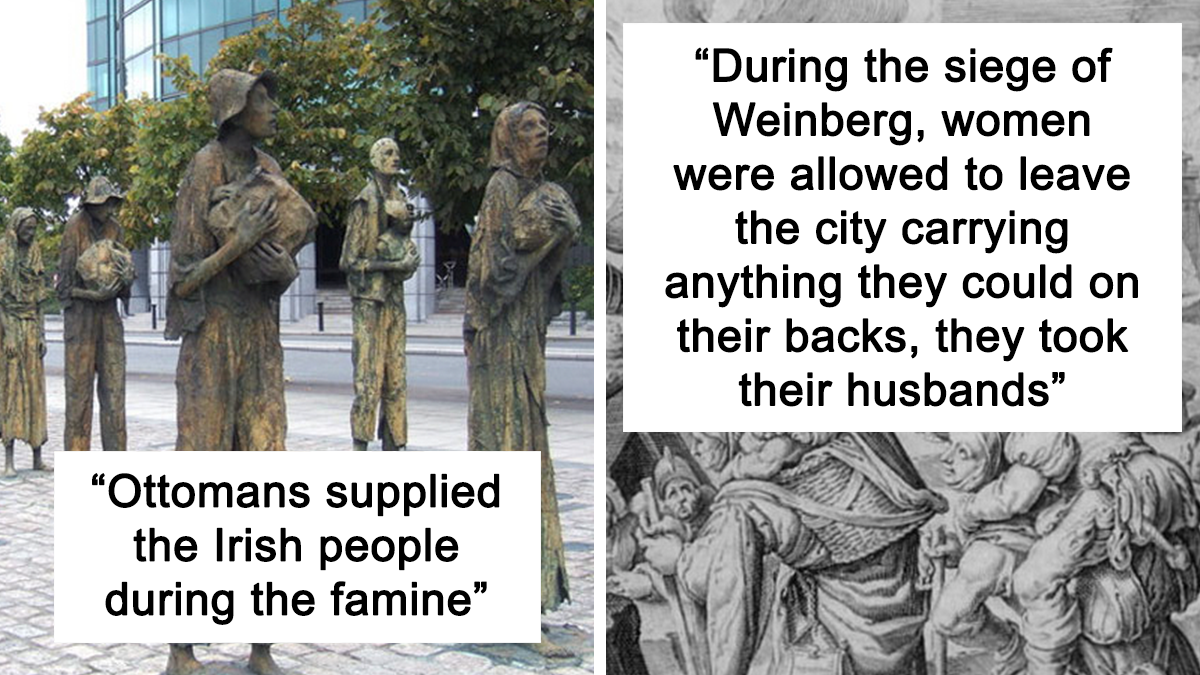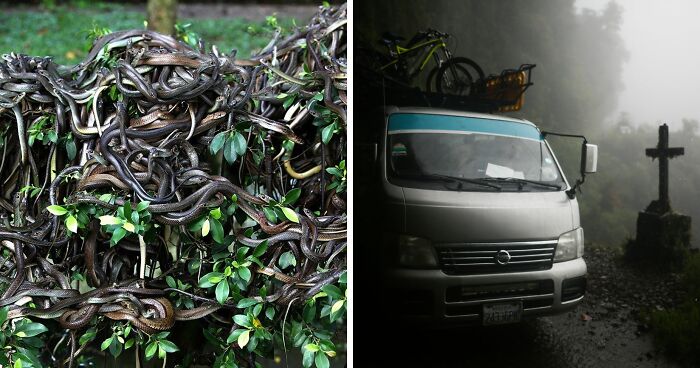While Ukraine is being invaded by Russia, we at Bored Panda decided to take a look back at the past and remember the moments when people proved they can be there for one another despite the difficult circumstances they were in.
We discovered a post on the subreddit r/history that has plenty of these examples—it began when user ThatLegendjpb asked the community to describe their favorite unexpected acts of kindness. Turns out, there have been plenty of such instances!
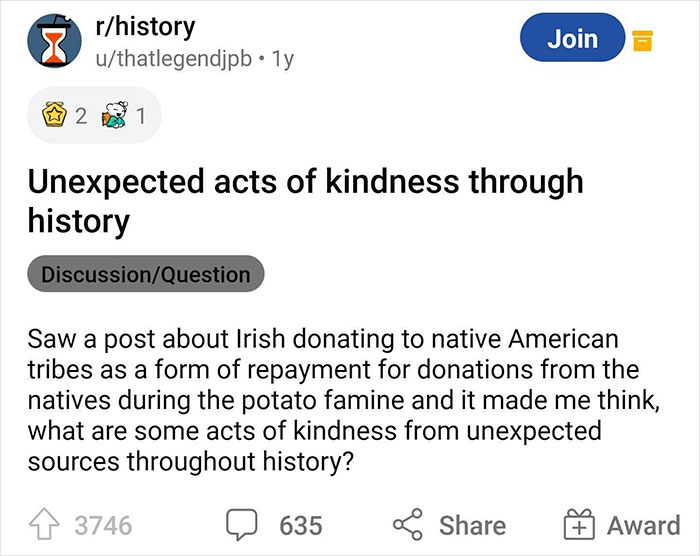
From ancient Rome to WWII, everyone began sharing proof that humanity isn't as bad as it sometimes seems so let's take a look at some of the wholesome stories and hope that the bloodshed in Europe will end soon.
This post may include affiliate links.
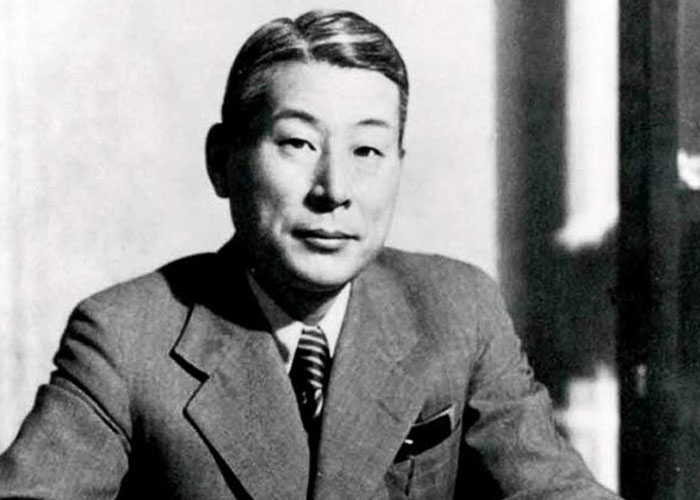 Japanese Diplomat in Lithuania during WW2. He was giving free travel passes to anyone who asked, especially Jews fleeing the holocaust. He was ordered by his government to stop and refused. As his embassy was being closed down, he and his wife were signing documents and handing them out to all refugees all the way to the train station; even to the point of throwing signed documents out the window as the train left.
He saved 6,000 to 10,000 lives by his actions and was later named among "the Righteous of Nations" and had his name and story entered into a museum in Israel to be forever remembered.
Japanese Diplomat in Lithuania during WW2. He was giving free travel passes to anyone who asked, especially Jews fleeing the holocaust. He was ordered by his government to stop and refused. As his embassy was being closed down, he and his wife were signing documents and handing them out to all refugees all the way to the train station; even to the point of throwing signed documents out the window as the train left.
He saved 6,000 to 10,000 lives by his actions and was later named among "the Righteous of Nations" and had his name and story entered into a museum in Israel to be forever remembered.
For anyone wondering, his name was Chiune Sugihara - Feels sad to mention this great story but not give his name.
Dr. Darren R. Reid, a historian who earned his Ph.D. from the University of Dundee and is now a lecturer at Coventry University, told Bored Panda that it's often not the scope of an action that can make it honorable.
"Personally, the greatest acts of kindness for me come from the smallest of gestures," he said. "Holding the door open for a stranger, smiling at someone when you make eye contact with them when you pass them in the street, making conversation with someone you find yourself sitting next to on a park bench, etc. These are far from the most elaborate acts of kindness, but they are things we can all do every second of every day. They cost nothing and, if everyone did them, I think the world would overall be a little better."
But if Dr. Reid was to answer the question on Reddit, he would probably choose the acceptance of refugees from warzones with no preconditions. "We should not live in a world where governments (such as the British government) only accept refugees in limited numbers. The rhetoric and ideologies of the Far Right have been allowed to burn through our society for too long. It is time we start putting humanitarianism and human rights back at the center of our thinking," he said.
But teaching young people at Coventry University has taught Dr. Reid that random acts of kindness, even if it means simply being a decent person, still hold value. "The young people I teach are dedicated humanitarians who are dedicated to making the world a better place and fixing some of the messes that have been created in recent years. They give me a lot of faith in the future," Dr. Reid explained.
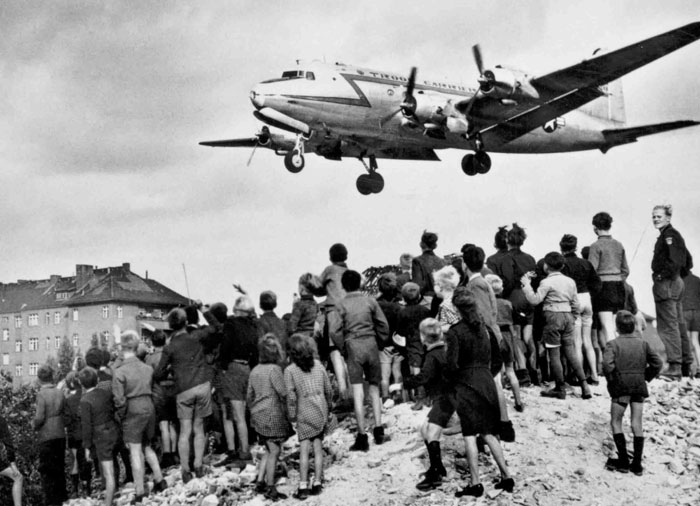 The candy bomber story post-WWII makes me cry every time. He’s still alive today. He’s 99 years old!
The US airlifted tons and tons of supplies daily to West Berlin when they were blocked and left to die by the Soviet Union. One pilot dropped tiny parachutes of candy for the German kids after an encounter with a group of them and they asked him what he was chewing. It was gum and they’d never seen one. He gave one to them and one kid split one piece of gum into many tiny pieces and shared it with all the kids. They said, “Someday we’ll have enough to eat, but if we lose our freedom, we’ll never get it back.” After that, he secretly started to gather candy, chocolates, and gum for them and told them to watch out for his plane. But he violated the rules by doing that and he was called to the office thinking he would get in trouble but he was encouraged instead. It was really heartwarming. The kids are now grown and they celebrate him every year and invite him to Germany all the time.
It was the sweetest story. I love it so much. Wars or times of crisis really bring out the worst or best in people. Eventually humanity always wins.
The candy bomber story post-WWII makes me cry every time. He’s still alive today. He’s 99 years old!
The US airlifted tons and tons of supplies daily to West Berlin when they were blocked and left to die by the Soviet Union. One pilot dropped tiny parachutes of candy for the German kids after an encounter with a group of them and they asked him what he was chewing. It was gum and they’d never seen one. He gave one to them and one kid split one piece of gum into many tiny pieces and shared it with all the kids. They said, “Someday we’ll have enough to eat, but if we lose our freedom, we’ll never get it back.” After that, he secretly started to gather candy, chocolates, and gum for them and told them to watch out for his plane. But he violated the rules by doing that and he was called to the office thinking he would get in trouble but he was encouraged instead. It was really heartwarming. The kids are now grown and they celebrate him every year and invite him to Germany all the time.
It was the sweetest story. I love it so much. Wars or times of crisis really bring out the worst or best in people. Eventually humanity always wins.
Gail Seymour Halvorsen. He passed away Feb 16, 2022. Didn't know about him before today but RIP buddy.
But what about groups of people, not individuals? Are, say, governmental entities capable of acting in someone else's interest? Absolutely! Sometimes.
"In terms of historic examples, look no further than the Choctaw who donated $170 to Ireland during the potato famine," Dr. Reid said.
"You have to understand that the Choctaw were a Native American tribe who suffered terribly during this period. They were one of the first nations to be forcibly removed under the Indian Removal Act, a piece of legislation designed to ethnically cleanse the eastern United States of its indigenous population. Aside from being forced out of their homes, the Choctaw were then marched across the continent, a journey that cost them at least 25%(!) of their population. The journey was so devastating they called it the Trail of Tears. That's already an astounding loss, but once the Choctaw arrived at their new home, they had few resources and, so, even more of their population was lost. It was a terrible, genocidal incident, and it is in that context that the Choctaw, learning about what was happening in Ireland, donated whatever they could to help."
In a lovely epilogue, Dr. Reid told us many Irish made donations to help two Native American reservations (Navajo and Hopi) in 2020 during the outbreak of the coronavirus, citing the generosity of the Choctaw as their inspiration. "With stories like that, who couldn't be hopeful?"
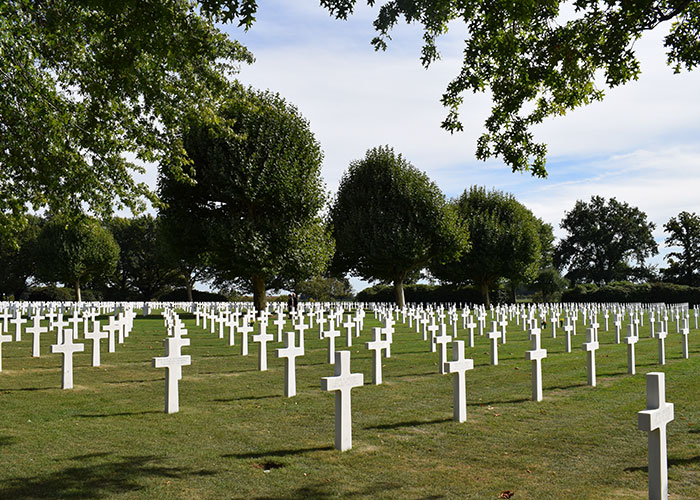 Not sure if this qualifies. The cemeteries of fallen soldiers in WWII in the Netherlands are adopted by local primary schools. Every year, they clean up the graves, add flowers and bring homage.
This includes the cemeteries of German soldiers
Not sure if this qualifies. The cemeteries of fallen soldiers in WWII in the Netherlands are adopted by local primary schools. Every year, they clean up the graves, add flowers and bring homage.
This includes the cemeteries of German soldiers
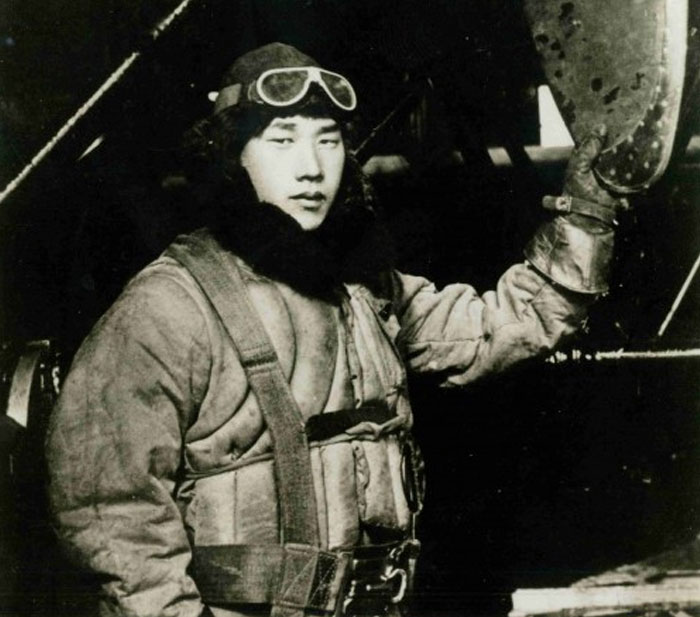 A Japanese pilot bombed a Canadian town during WWII and started a huge forest fire. He returned after the war to apologize and offered them his sword, which is still on display to this day. He went with the intent to commit ritual suicide if that’s what they wanted as an apology since he felt so ashamed of it. They made him an honorary citizen instead and the sword is displayed in the library.
A Japanese pilot bombed a Canadian town during WWII and started a huge forest fire. He returned after the war to apologize and offered them his sword, which is still on display to this day. He went with the intent to commit ritual suicide if that’s what they wanted as an apology since he felt so ashamed of it. They made him an honorary citizen instead and the sword is displayed in the library.
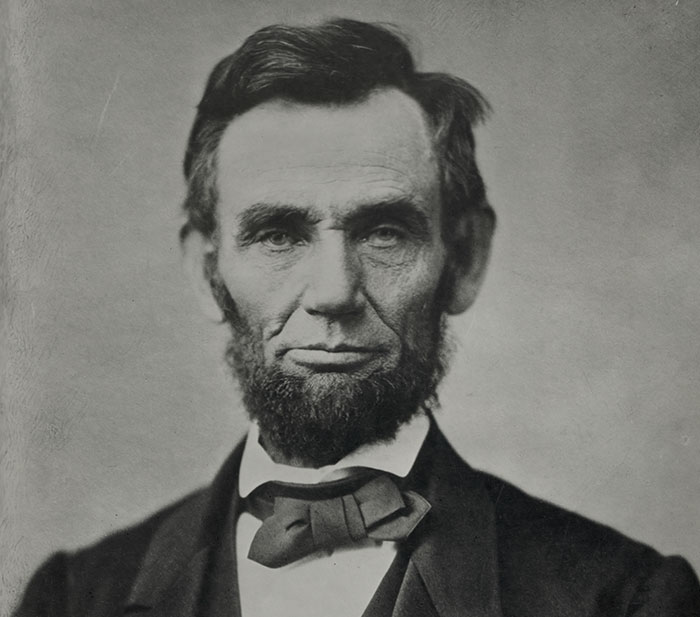 During the Civil War, textiles mills in Manchester, England refused to work with cotton picked by slaves, putting a massive economic burden on the city, and Lincoln personally sent them a letter thanking them.
During the Civil War, textiles mills in Manchester, England refused to work with cotton picked by slaves, putting a massive economic burden on the city, and Lincoln personally sent them a letter thanking them.
In Oldham, North Manchester, which was a mill town, they set the workers to building a park - Alexandra Park in the Hathershw/Glodwick area of Oldham
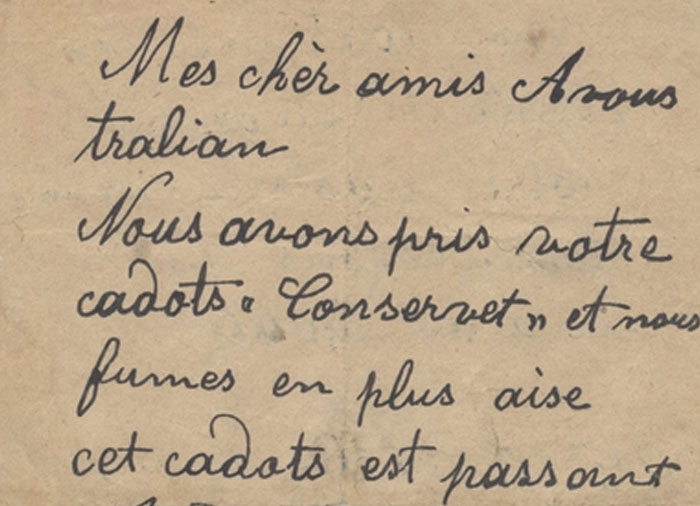 Wasn’t there a story from Gallipoli where an Australian sergeant was trying to show his men proper grenade throwing techniques, and he threw a can of beef towards the Ottoman line to demonstrate? Then a few minutes later a tin full of cigarettes was thrown back with a note in rough French (the lingua Franca of the time) thanking them for the gift of beef and offering the cigarettes in return?
Wasn’t there a story from Gallipoli where an Australian sergeant was trying to show his men proper grenade throwing techniques, and he threw a can of beef towards the Ottoman line to demonstrate? Then a few minutes later a tin full of cigarettes was thrown back with a note in rough French (the lingua Franca of the time) thanking them for the gift of beef and offering the cigarettes in return?
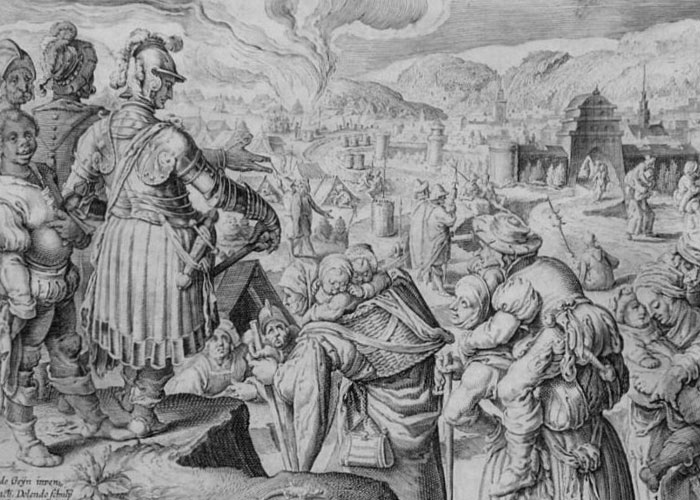 Don't know much about the details of this conflict, but during the siege of Weinberg, women were allowed to leave the city carrying anything they could on their backs. Rather than carrying their possessions, they took their husbands. The king who was leading the siege praised them and decided to keep his word, allowing them to leave.
Perhaps not really nice in modern terms, when the alternative was just slaughtering half the city, but comparatively nice in its time.
Don't know much about the details of this conflict, but during the siege of Weinberg, women were allowed to leave the city carrying anything they could on their backs. Rather than carrying their possessions, they took their husbands. The king who was leading the siege praised them and decided to keep his word, allowing them to leave.
Perhaps not really nice in modern terms, when the alternative was just slaughtering half the city, but comparatively nice in its time.
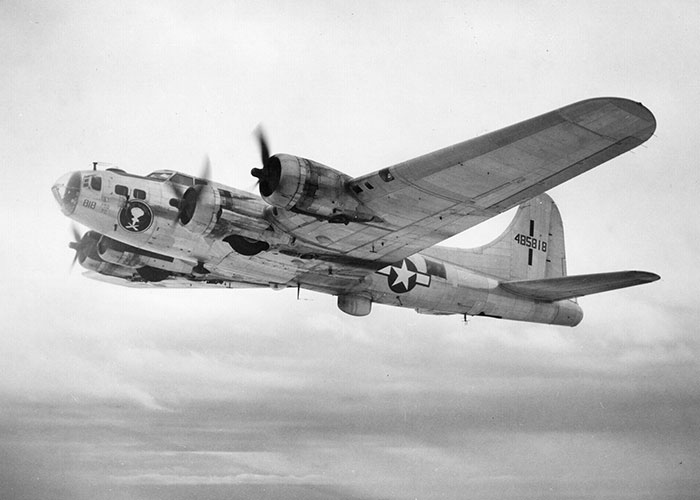 During ww2, American bombers were bombing Bremen, and a bomber was severely damaged by German fighters. Fighter pilot Franz Stigler, recently rearmed and refueled, caught up with the retreating bomber in his BF109, and could see through the damages the injured crew. Instead of finishing it off, he stayed close to the bomber so that german Anti-Air would not target them. He tried to mouth and gesture for them to fly to Sweden to get aid, but pilot Charlie brown and crew didn't understand. Franz then maintained the escort until they were over open water.
Franz did this because he considered finishing a damaged plane with the injured crew the same as shooting parachuting pilots, which was (and is) a war crime.
Charlie Brown 50 years later managed to find Franz and they became friends until Franz's death.
During ww2, American bombers were bombing Bremen, and a bomber was severely damaged by German fighters. Fighter pilot Franz Stigler, recently rearmed and refueled, caught up with the retreating bomber in his BF109, and could see through the damages the injured crew. Instead of finishing it off, he stayed close to the bomber so that german Anti-Air would not target them. He tried to mouth and gesture for them to fly to Sweden to get aid, but pilot Charlie brown and crew didn't understand. Franz then maintained the escort until they were over open water.
Franz did this because he considered finishing a damaged plane with the injured crew the same as shooting parachuting pilots, which was (and is) a war crime.
Charlie Brown 50 years later managed to find Franz and they became friends until Franz's death.
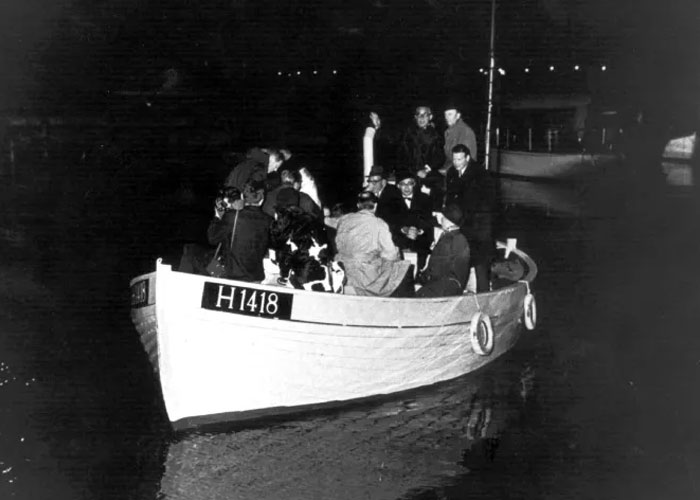 One of my favorite stories of World War II involves Denmark. In September 1943, Denmark had been occupied by Germany for a month or so. The news came out that all Jews would be deported to camps the next day, but the Danes refused to allow that to happen.
In a day—a SINGLE day—they were able to get 90% of Denmark’s Jews to the coast. From there, they crammed the refugees into every seaworthy vessel there was, many of them just little fishing boats, and brought them over to Sweden, which had not been occupied and was still neutral. Although some boats were stopped, and although some opportunistic Danes took advantage of their neighbors’ desperation, it remains in my mind one of the most heroic actions of history.
When I think of the ways an entire country can mobilize to be kind, I always think of that night.
One of my favorite stories of World War II involves Denmark. In September 1943, Denmark had been occupied by Germany for a month or so. The news came out that all Jews would be deported to camps the next day, but the Danes refused to allow that to happen.
In a day—a SINGLE day—they were able to get 90% of Denmark’s Jews to the coast. From there, they crammed the refugees into every seaworthy vessel there was, many of them just little fishing boats, and brought them over to Sweden, which had not been occupied and was still neutral. Although some boats were stopped, and although some opportunistic Danes took advantage of their neighbors’ desperation, it remains in my mind one of the most heroic actions of history.
When I think of the ways an entire country can mobilize to be kind, I always think of that night.
 The Dutch government donates tulips to Canada every year as a thank you for hosting their royal family during WW2 and the Canadian involvement in liberating the Netherlands. A princess was born in Canada and the hospital room was declared extraterritorial so she could be born Dutch.
The Dutch government donates tulips to Canada every year as a thank you for hosting their royal family during WW2 and the Canadian involvement in liberating the Netherlands. A princess was born in Canada and the hospital room was declared extraterritorial so she could be born Dutch.
Canada declared the hospital room at the Civic Hospital in Ottawa as "Dutch sovereignty " and had dirt from the Netherlands spread under the birthing bed to seal the deal.
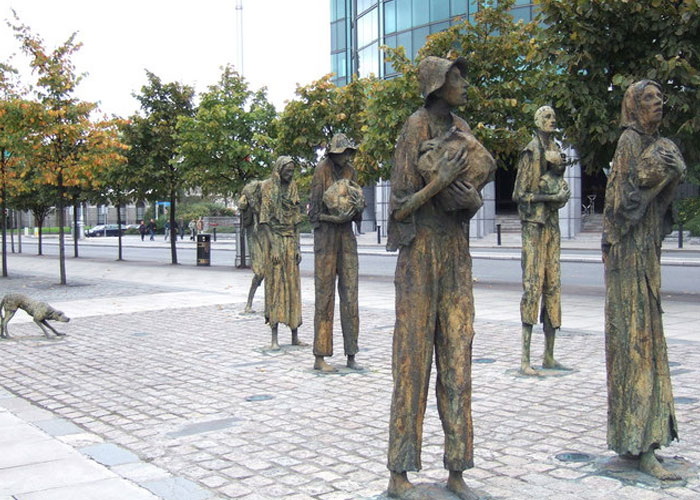 Ottomans supplied the Irish people during the famine (hence the crescent on Drogheda united)
Ottomans supplied the Irish people during the famine (hence the crescent on Drogheda united)
I had never heard this before: At a time when Ireland was enduring the terrible loss of a million dead and the mass exodus of a million more during the Great Hunger, the story goes that the Ottoman Sultan, Khaleefah Abdul-Majid I, declared his intention to send £10,000 to aid Ireland's farmers. However, Queen Victoria intervened and requested that the Sultan send only £1,000 because she had sent only £2,000 herself. So the Sultan sent only the £1,000, but he also secretly sent five ships full of food. The English courts attempted to block the ships, but the food arrived in Drogheda harbor and was left there by Ottoman sailors. That £10,000 that the Sultan pledged to the Irish would be worth approximately £800,000 ($1.7m) today.
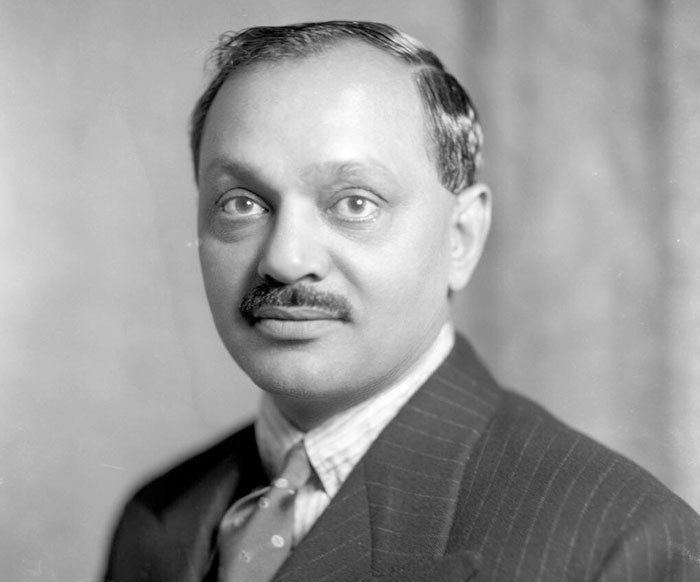 An Indian king (the Indian Oskar Schindler) provided refuge to 20,000 Polish orphans during WW 2. It's a fascinating story of humanity at a time of great suffering.
An Indian king (the Indian Oskar Schindler) provided refuge to 20,000 Polish orphans during WW 2. It's a fascinating story of humanity at a time of great suffering.
Initially, the British Governor denied their entry to India. The Polish consulate raised awareness of their situation, after which Maharaja Digvijaysinghji Ranjitsinghji Jadeja granted them refuge. He arranged for Polish cooks after the young children found Indian food too spicy! Today, Poland is helping Indian students escaping war in Ukraine.
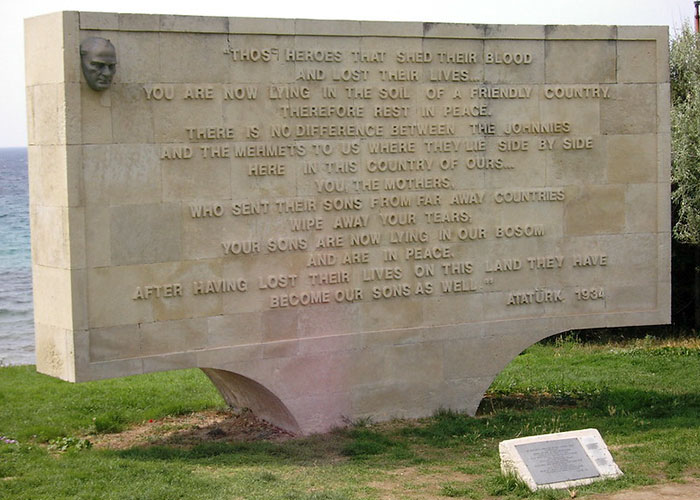 The memorial in Gallipoli reads:
Those heroes who shed their blood and lost their lives! You are now lying in the soil of a friendly country. Therefore rest in peace. There is no difference between the Johnnies and Mehmets to us where they lie side by side here in this country to of ours. You, the mothers, who sent their sons from far away countries wipe away your tears; your sons are now lying in our bosom and are in peace. After having lost their lives on this land they have become our sons as well.
Atatürk, 1934
The memorial in Gallipoli reads:
Those heroes who shed their blood and lost their lives! You are now lying in the soil of a friendly country. Therefore rest in peace. There is no difference between the Johnnies and Mehmets to us where they lie side by side here in this country to of ours. You, the mothers, who sent their sons from far away countries wipe away your tears; your sons are now lying in our bosom and are in peace. After having lost their lives on this land they have become our sons as well.
Atatürk, 1934
The caveat with Ataturk is always that everything nice he did was tainted by the Armenian genocide.
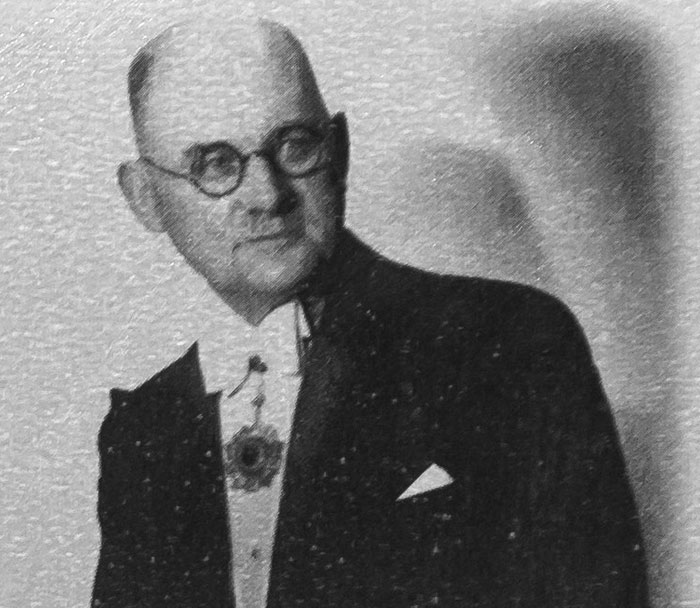 That reminds me of the "good nazi", John Rabe.
He was the local Nazi party representative in Nanking in the run up to the Japanese attack. He used his status and monumental brass balls to establish a safety zone. It's estimated he saved the lives of some 200.000 Chinese nationals.
During the war, he moved back to Germany and after the war, his party membership got him in trouble and he and his family lived in poverty for a number of years.
When the citizens of Nanking learned of this they raised $2.000 for him and sent him monthly food packages from mid-1948 to when the communists took over China.
That reminds me of the "good nazi", John Rabe.
He was the local Nazi party representative in Nanking in the run up to the Japanese attack. He used his status and monumental brass balls to establish a safety zone. It's estimated he saved the lives of some 200.000 Chinese nationals.
During the war, he moved back to Germany and after the war, his party membership got him in trouble and he and his family lived in poverty for a number of years.
When the citizens of Nanking learned of this they raised $2.000 for him and sent him monthly food packages from mid-1948 to when the communists took over China.
In 1862 Lancashire (UK) cotton mill workers refused to work with any cotton that was picked by slaves. A lot of them lost their jobs and their livelihoods because of it. Really great symbol of kindness from people who had barely anything, to begin with.
The Northern part of the Netherlands was liberated by Canadians and Polish troops (although most people think they were Americans). The gratitude of the Netherlands to Canada is already described elsewhere, but we (I am Dutch) also have a soft spot for the Polish people. When in the 80s Poland was trying to get their own independence instead of being a vassal state of the Soviet Union, the economy collapsed and there was a large shortage of food, goods, etc. The Solidarnocs movement tried to help, together with the Catholic church, but they needed help. Word reached the Netherlands and some collections were started. Within no time, we had multiple convoys of 150+ large trucks filled up to the brim with everything from potatoes to teddy bears. Many contacts were made between local communities in Poland and the Netherlands.
Poland in the 80s and early 90 received so much help from all over the world. People had gotten packs with food, clothes, and medicines when it was nothing to eat and inflation was extremely high.
Maybe not kindness directly, but when Napoleon sent his troops to subjugate the Haitians fighting for their independence his Polish troops when learned that people they were supposed to take their lives from were simply fighting for their freedom, they switched sides and fought alongside the Haitians (a lot of them at least). For this, they received Haitian citizenship and settled there.
I have an example that is pre-historic. A body of a young man from a nomadic people was found in a gravesite the US (Florida I think). He was surrounded by objects useful in his afterlife, so he was not merely dumped. Examination of the body indicated he had been born with a crippling disease. He was not capable of walking and would have been entirely dependent on his family, clan or tribe for survival. Yet he lived to young adulthood and was valued. He had been carried around and cared for by them.
That is more kind then how some people treat people with a crippling disease
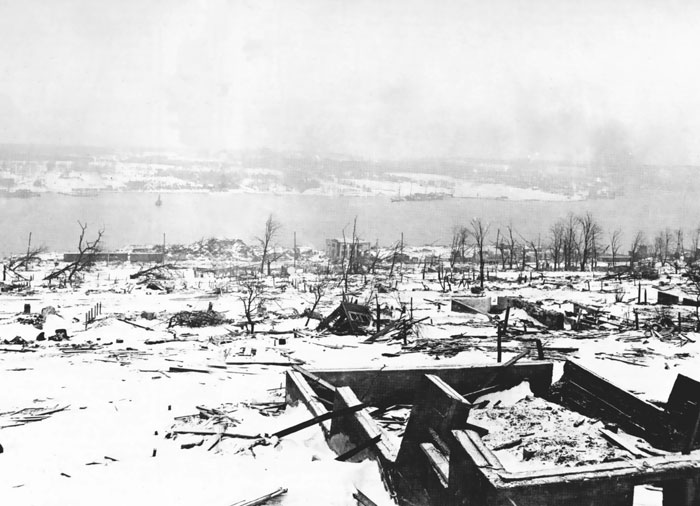 During WW1, the Canadian city of Halifax experienced a catastrophic explosion in December when a supply vessel carrying explosives and ammunition collided with another ship that detonated its cargo. At the time, it was the largest man-made explosion. This destroyed a large portion of the city, caused a tsunami, blinded and took a lot of citizens' lifes who were watching from their windows. Shortly after, a blizzard hit the area. American ships nearby were affected by the blast and altered course to help. Boston sent relief aid and supplies. Every year, even 100 years later, Nova Scotia sends a large fir tree for Christmas as a token of gratitude.
During WW1, the Canadian city of Halifax experienced a catastrophic explosion in December when a supply vessel carrying explosives and ammunition collided with another ship that detonated its cargo. At the time, it was the largest man-made explosion. This destroyed a large portion of the city, caused a tsunami, blinded and took a lot of citizens' lifes who were watching from their windows. Shortly after, a blizzard hit the area. American ships nearby were affected by the blast and altered course to help. Boston sent relief aid and supplies. Every year, even 100 years later, Nova Scotia sends a large fir tree for Christmas as a token of gratitude.
I'm from the Halifax area. A couple of years ago my sister and I were lucky enough to visit Boston for the tree lighting (the tree Halifax sends each year is used in the Boston Common as their official Christmas Tree). It was very moving, especially since it was the 100th anniversary of the Halifax Explosion that year. So very glad we went!
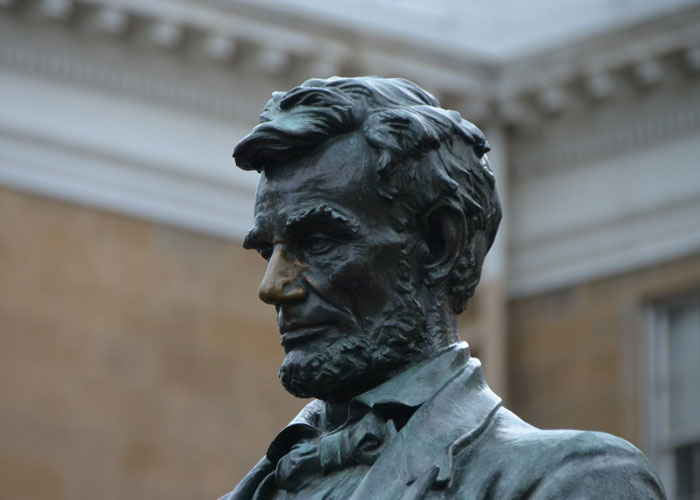 You can look at San Marino, the world's oldest existing democracy because there's a lot of it. During the American Civil War, they sent a letter honoring President Lincoln and offered him citizenship, which Lincoln accepted. Also, they took in 100,000 refugees during WW2. Their population at the time was 15,000.
You can look at San Marino, the world's oldest existing democracy because there's a lot of it. During the American Civil War, they sent a letter honoring President Lincoln and offered him citizenship, which Lincoln accepted. Also, they took in 100,000 refugees during WW2. Their population at the time was 15,000.
An example of how to help your fellow human beings in times of conflict ......
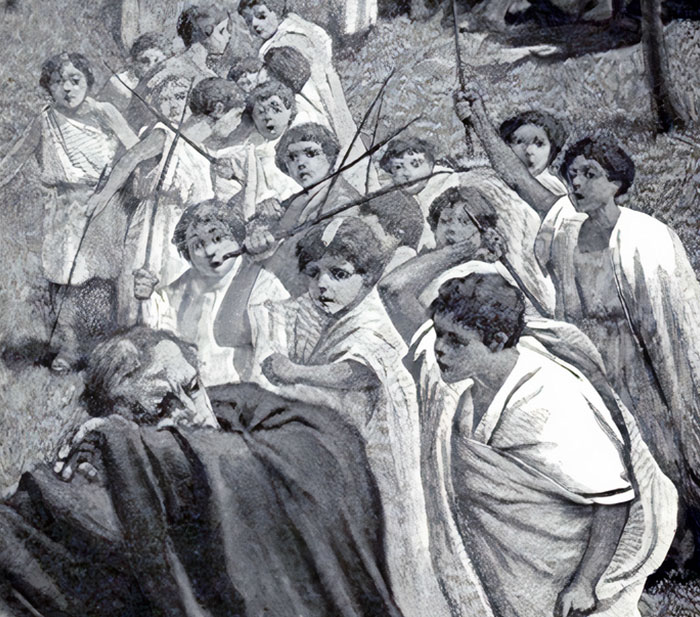 According to the Roman historian Livy, at some point in the fourth century BC, Rome was at war with the Etruscans and the consul Camillus was laying siege to the city of Falerii. In that city there was a tutor who was entrusted with some of the children of the most powerful families. Under the pretext of getting the boys some exercise, he led them outside the city walls and all the way to the Roman camp, thinking that he would be richly rewarded for bringing these valuable hostages.
But Camillus, ever the model of Roman virtue, was so appalled that he had the tutor stripped and beaten, then gave all the students sticks and flails so they could whip him all the way back to the gates. The Falerians, when they saw what was happening, were so astonished by Camillus's righteousness that they immediately surrendered, willingly and peacefully, confident that they would receive a fair treatment under Roman rule.
According to the Roman historian Livy, at some point in the fourth century BC, Rome was at war with the Etruscans and the consul Camillus was laying siege to the city of Falerii. In that city there was a tutor who was entrusted with some of the children of the most powerful families. Under the pretext of getting the boys some exercise, he led them outside the city walls and all the way to the Roman camp, thinking that he would be richly rewarded for bringing these valuable hostages.
But Camillus, ever the model of Roman virtue, was so appalled that he had the tutor stripped and beaten, then gave all the students sticks and flails so they could whip him all the way back to the gates. The Falerians, when they saw what was happening, were so astonished by Camillus's righteousness that they immediately surrendered, willingly and peacefully, confident that they would receive a fair treatment under Roman rule.
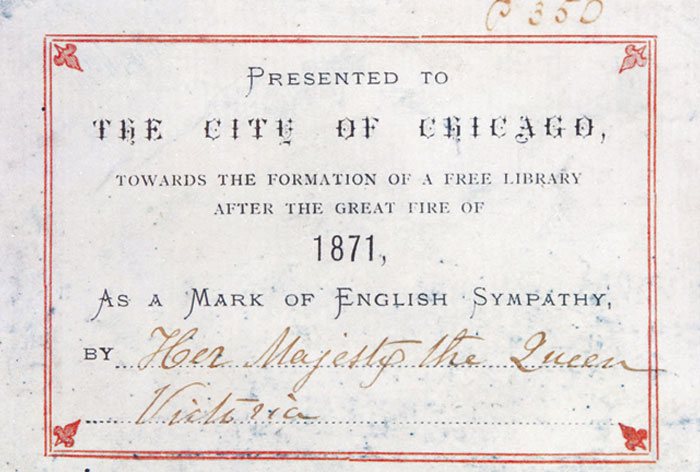 Queen Victoria gave many books to the Chicago Library after the Great Chicago Fire.
Queen Victoria gave many books to the Chicago Library after the Great Chicago Fire.
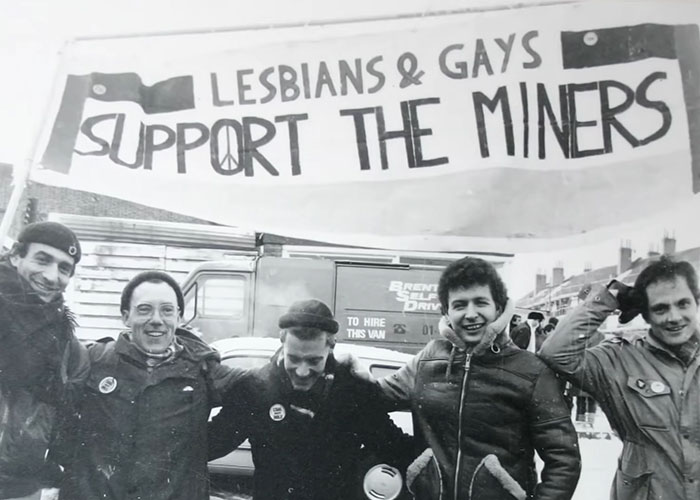 Didn’t the English and Welsh unions participate in the Gay Pride parades in London in the Eighties because a group of gay advocates supported a small welsh town during the labor strikes? There was a movie about it-Pride. Good flick.
Didn’t the English and Welsh unions participate in the Gay Pride parades in London in the Eighties because a group of gay advocates supported a small welsh town during the labor strikes? There was a movie about it-Pride. Good flick.
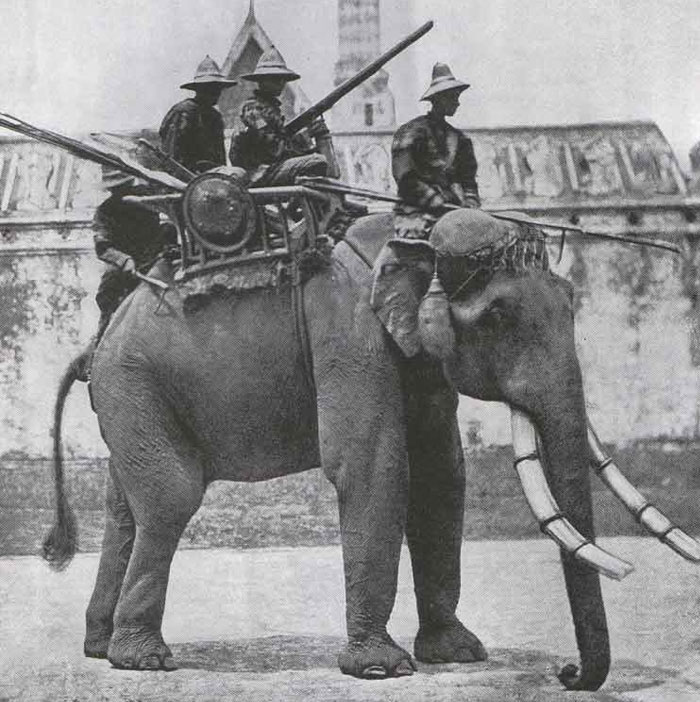 King Rama IV of Siam (now Thailand) offered war elephants to Abraham Lincoln during the American civil war.
King Rama IV of Siam (now Thailand) offered war elephants to Abraham Lincoln during the American civil war.
Picturing elephants at Gettysburg and I honestly don't know what to feel
In Belgium, every new law has to be passed via the king himself. In 1990 there was a law to fully legalize abortion to be passed. The king himself, king Baudouin, was a member of the catholic church and couldn't get any children with his wife, queen Faiola. Passing this law would be against his beliefs as a Christian and against their own child's wishes. Realizing it was the right thing to do, he stepped down as king of Belgium for a day. That way parliament could approve of the new law and he never approved it.
The fact that a woman's body was/is governed by law and religion is ridiculous.
I’d say, Ruth Coker Burks, an AIDS awareness activist and caregiver back in the height of the AIDS epidemic. So many people had been kicked to the curb, utterly abandoned to die a horrible death alone, and she was one of the only people willing to step in and help them. It’s equally parts tragic and infuriating that she had to do any of that in the first place, but the fact that she did genuinely makes me cry every time I read about her.
This was such an awful time and AIDS victims were treated horribly. I grew up in Indiana, center of the Ryan White controversy. Ryan White was a child who contracted HIV through a blood transfusion. People treated him horribly. Parents screamed at him, openly protested and threatened to pull their kids out of school if he was in attendance. He was yelled at, spat at and called all sorts of horrible things. He just wanted to be a kid. It felt like they were protesting his very existence. I also had two cousins die of AIDS in the 1980s. Such a dark, uncertain time. I later worked at the hospital where Ryan was treated and eventually died. There's a memorial for him at Riley Hospital for Children in Indianapolis, Indiana.
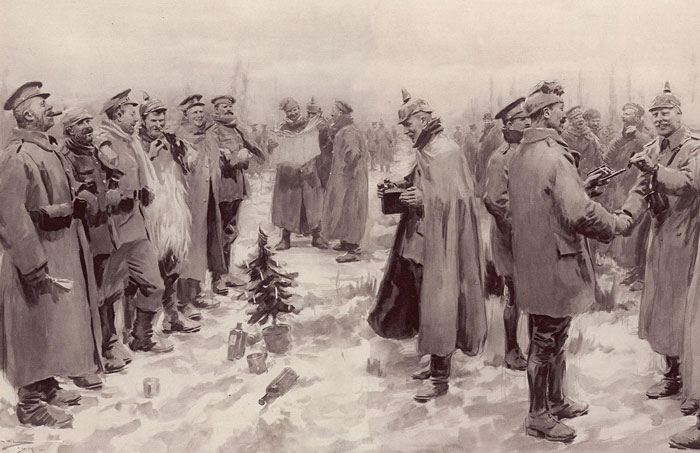 A pretty famous incident is the unofficial Christmas truce during WW1. They shared presents from home like chocolate and tea, and then in other parts of the line there was no truce and they still fired on each other
A pretty famous incident is the unofficial Christmas truce during WW1. They shared presents from home like chocolate and tea, and then in other parts of the line there was no truce and they still fired on each other
Some 60 years ago, the USSR proposed to the UN to bundle international efforts to eradicate smallpox. Now almost exactly 40 years ago, humanity succeeded.
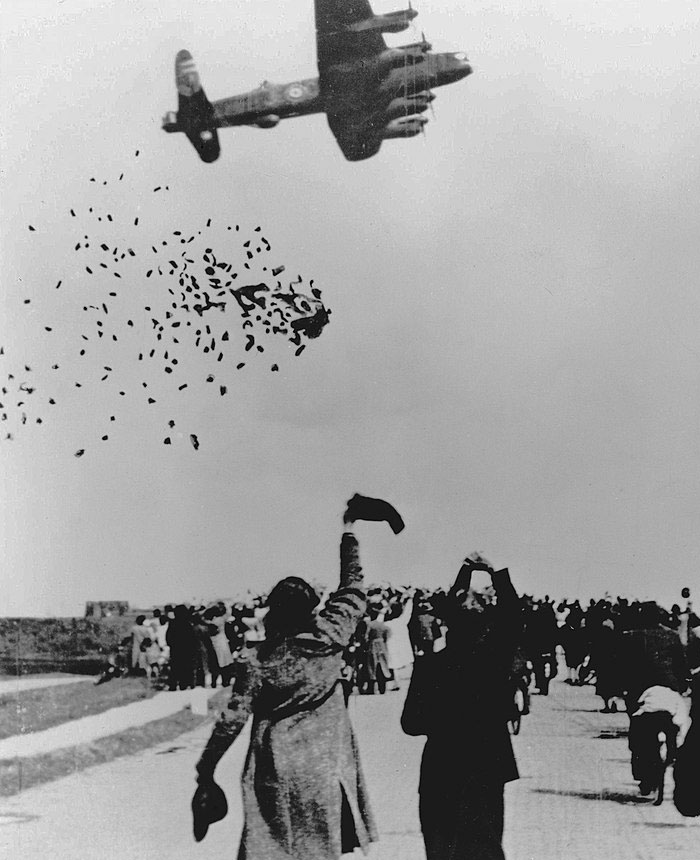 Operation Manna and Operation Chowhound. In the spring of 1945, the Netherlands was suffering from a famine. A truce was brokered between the allies and the local German occupation leaders to allow several thousand tons of food to be delivered into the occupied Netherlands.
Operation Manna and Operation Chowhound. In the spring of 1945, the Netherlands was suffering from a famine. A truce was brokered between the allies and the local German occupation leaders to allow several thousand tons of food to be delivered into the occupied Netherlands.
Is it just me, or does it look like there’s a person falling down, too? 🤔
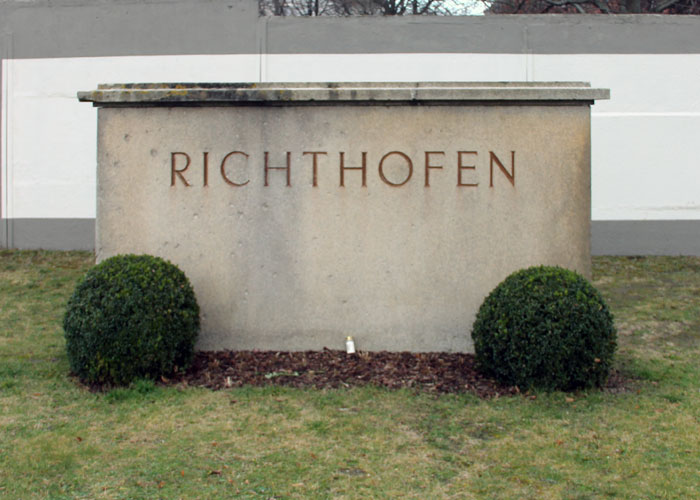 A sort of Chivalry seems to be a fairly common thing among wartime pilots. When Manfred Von Richthofen was shot down he was given a full military funeral by the Australian Flying Corps (They were the nearest Allied Air Unit and took responsibility for the body).
A sort of Chivalry seems to be a fairly common thing among wartime pilots. When Manfred Von Richthofen was shot down he was given a full military funeral by the Australian Flying Corps (They were the nearest Allied Air Unit and took responsibility for the body).
My favorite is Jonas Salk's steadfast objection to the patenting of his polio vaccine. True, there were also legal difficulties in securing patent rights, but officials at the University of Pittsburgh decided not to pursue intellectual property protections largely due to Salk's insistence.
The Balmis Expedition, officially called the Real Expedición Filantrópica de la Vacuna (Royal Philanthropic Vaccine Expedition) was a three-year mission, from 1803 to 1806, to Spanish America and Asia led by Dr. Francisco Javier de Balmis with the aim of vaccinating millions against smallpox.
In the year 586 BCE, the king of Babylon conquered Jerusalem, declared all the jews to be slaves, and had them hauled off to Babylon. About 70 years later, Sirus the Great, King of Persia, crushed Babylon. Not only did he free all the jews and return them to Jerusalem, but he also partially funded the rebuilding of the Jewish temple. Judaism at this time was a temple society, meaning they had no written codified religious text, and their culture and traditions were passed on orally. Without their temple, Jewish culture was in serious danger of extinction due to a lack of structure through which to pass on their traditions. If it weren't for King Sirus, the Jewish people as a religious and ethnic group might not even exist today. For his liberation of the jews and the rebuilding of their temple, Sirus was named Messiah and is to date the only non-Jewish person to receive the title.
King Cyrus the Great was a Zorastrian, one of the most ancient religions still practiced today. It probably influenced Judaism significantly. People who practice Zorastrianism are some of the most lovely people you could ever meet.
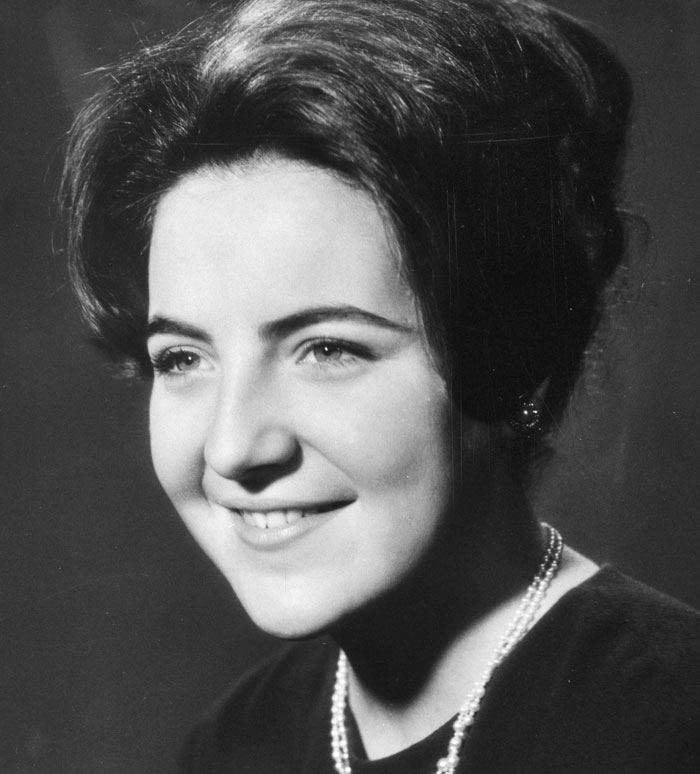 The Dutch Royal family was about to have a newborn girl in 1941. Preferably, the child would be born on Dutch soil so that the child would be solely Dutch by birth and never have any other citizenships. The issue with that was, The Netherlands was under German occupation at this point, and the Dutch Royal family (minus the Queen herself) was in Canada. The Canadian government declared the ward where the Royal child was to be born to be temporarily extraterritorial, so basically a no man's land. That way, she would be Dutch via her mother and only Dutch. As a gesture of good faith, the Canadian Parliament even raised the Dutch flag instead of the Canadian flag. Even today, that is the only time since Canada’s inception a foreign flag was raised there. That daughter is still alive, as Princess Margriet.
The Dutch Royal family was about to have a newborn girl in 1941. Preferably, the child would be born on Dutch soil so that the child would be solely Dutch by birth and never have any other citizenships. The issue with that was, The Netherlands was under German occupation at this point, and the Dutch Royal family (minus the Queen herself) was in Canada. The Canadian government declared the ward where the Royal child was to be born to be temporarily extraterritorial, so basically a no man's land. That way, she would be Dutch via her mother and only Dutch. As a gesture of good faith, the Canadian Parliament even raised the Dutch flag instead of the Canadian flag. Even today, that is the only time since Canada’s inception a foreign flag was raised there. That daughter is still alive, as Princess Margriet.
Off the top of my head, there's the Dunkirk evacuation where pretty much anybody with a boat crossed the Channel to help evacuate the trapped Allied forces. Then there's the Berlin Airlift. Russia blockaded West Berlin in an effort to get America England and France to cede their claim to the city rather than risk open conflict. Instead, they spent the next year airlifting 2.3 million tons of supplies until the Russians finally reopened the supply lines. In all, there was an allied cargo plane either landing or taking off in West Berlin every 30 seconds for 12 months straight.
Also note it was the Soviet Union not "Russia". The two are not the same.
After the Civil war and the intervention in Soviet Russia, there was a terrible famine (1921 -1922). Many people then helped Soviet Russia. Children broke their piggy banks to send money to the starving. The great Fridtjof Nansen did the most in organizing famine relief. One girl saved from starvation wrote a poem: Hello, great Nansen, From your little friends! Don't forget, great Nansen, Happy, happy children! According to Liv Nansen, her father considered this children's poem written in Russian to be his main award for his work in Russia. The piece of paper with the poem is still kept in the Nansen family.
The US also provided a lot of aid and is credited with saving millions through the involvement of both Herbert Hoover ( yes that Hoover)'s Red Cross and the Society of Friend's ( Quakers) relief work. There are some good books out on it including "The Russian Job: The Forgotten Story of How America Saved the Soviet Union from Ruin" by Douglas Smith, and "American Girls in Red Russia" by Julia Micklenberg. There are podcast interviews with both authors about their books online if you want to know more but don't want to spend a fortune on books
Correct me if I’m wrong but Holy Roman Emperor Frederick the second was friends with his supposed Muslim enemy in the Middle East the Sultan of the Ayyubid kingdom during the 6th crusade and peacefully regained Jerusalem for Christendom while maintaining that certain Muslim sites remain under Muslim control
Canadian troops in Holland went out of their way to feed the starving population as Germany had taken all their food during world war two. When the lower-level german officers started to pull out Canadian commanders tried to negotiate with them to give humanitarian aid to local populations. There are stories of Canadian troops giving Dutch kids chocolate and they didn't know what to do with it because they had never eaten it because of the German occupation. When I was in Army Cadets I attended a ceremony held by the french embassy in Vancouver where they gave WW2 vets the highest french medal in their military as a thank for their liberation. The Dutch were there too and they were very thankful for this day they celebrate Canada day on July 1st. As a young man, the Canadian world war two generation left me with a sense of large shoes to fill. They truly are the greatest generation, it's sad my generation will be one the last to be blessed with their: humility, respect, and strong work ethic. As a history buff, I hope that to the younger generations of Canadians I can help them remember whose and what country they have inherited after their time.
Every year since 1947 Norway has sent a Christmas tree to London as thanks for the help during WWII. The tree is displayed at Trafalgar square.
An unexpected act of kindness that did not get rewarded is the story of Dirk Willems. Willems was born in Asperen, Gelderland, Netherlands, and was baptized as a young man, thus rejecting the infant baptism practiced at that time by both Catholics and established Protestants in the Netherlands. This action, plus his continued devotion to his new faith and the baptism of several other people in his home, led to his condemnation by the Roman Catholic Church in the Netherlands and subsequent arrest. Willems was held in a residential palace turned into a prison, from which he escaped using a rope made out of knotted rags. Using this, he was able to climb out of the prison onto the frozen moat. A guard noticed his escape and gave chase. Willems was able to traverse the thin ice of a frozen pond, the Hondegat, because of his lighter weight after subsisting on prison rations. However, the pursuing guard broke through the ice and yelled for help as he struggled in the icy water.[1] Willems turned back to save the life of his pursuer, thus being recaptured and held until he was burned at the stake near his hometown on 16 May 1569.
Karl Plagge was a German engineer and member of the Nazi Party. During WW2, he was a Wehrmacht member and worked in Lithuania. Like Schindler, he hired Jewish men to work in the labor camp, and took their wives and children there, too, and this way he saved over 1000 people. However, Nazis sometimes came to that camp and take some people's lives and Plagge didn't (or probably wasn't able to) say anything against that, once they took about 250 children and took their lives, Plagge blamed himself for that (he was on vacation during the action). But anyway, just 2000 out of 100 000 Vilnius Jews survived the Holocaust, and most of them were those saved by Plagge.
The Philippines once took in 6000 Russian refugees back in the 1940s. These refugees, who called themselves White Russians, escaped Russia when Lenin took over. They temporarily settled in China until Mao's communists won the civil war. Looking for a new place to settle, the Philippines under President Quirino offered a place for them in a province in the Visayas island group. The refugees would stay there for 2 years before resettling in the US and South America. Decades later, the Philippines suffered through the super typhoon Yolanda. Descendants of the refugees repaid their former homes by sending donations.
Portugal donated Finland numerous commodities during the Russian-Finnish War in 1940 which amounted to a total of around 90 million Finnish Marks. The chief trade route was between Petsamo and Lisbon. The commodities given included paper, sardines, cashew, citric acid, turpentine, sugar, coffee, furs, locks, sporting goods, cork, and port wine. Portugal also participated in the acquisition of one of the 12 Finnish ships that were stationed in American ports. Based on records in the Portuguese national archives, this trade activity and diplomatic exchanges continued until the end of the war. Given Portugal’s own political affiliation, the country resisted the communist encroachment of Finland by offering assistance. Portugal had already cut diplomatic ties with the Soviet Union in 1918, which would not be reopened until 1974. Numerous meetings occurred between Finnish and Portuguese diplomats as to provide Finland with greater economic means to endure Soviet attacks.
The Polish generals- Kosciuszko and Pulaski helped the North during the Civil War in the fight against slavery. Kosciuszko was a great strategist, he also gave all his salary to Jefferson to buy out as many slaves as possible.
This was the inspiration for Sabaton's song Heart of Iron. "During the final battle of Berlin in 1945 the general of the 12th army, Walther Wenck realized that the end of the war was coming, and instead of trying to defeat the advancing Soviet forces as his orders were, he used his army to create an escape corridor out of Berlin. For such an act he would surely have been sentenced to death, but instead, he ended up being responsible for up to 250 000 people safely escaping the burning city of Berlin. For some, this was a battle, for him this was a rescue operation". The corridor was so that he could surrender to the Americans and British, which is more preferable to the Soviets. He was also one of the last people to leave.
I heard of this. This time, there was a huge nos of jokes circulating because they recieved quite an interesting tree... Some jokingly said that they (brits) must have finally pissed Norway for them to send such a tree... all in good spirit though
In the gardens of my city, there is this tiny Tudor village that is all below waist height. It was given as a gift to the City of Melbourne for providing food to England during the war.
It’s smaller but Ernest Shackleton’s Trans-Antarctic expedition was a disaster. Stranded on ice for months. But Shackleton made sure every single man-made it home alive.
In 1894, a massive forest fire engulfed Hinckley, Minnesota. Think the recent fires in Australia. It swallowed 350,000 acres in 5 hours. Those who managed to outrun the fire lost everything- family, homes, jobs, everything but the clothes on their backs and some times they didn’t even have that (fire burned a lot of clothing). There was a flood of support and mostly from small grass-roots organizations like churches, ladies societies, and schools. They made and donated clothes, made hundreds of meals twice a day, brought widows and orphans into their own homes. They donated cash and household supplies; tended the injured and helped scattered families reconnect. They even hosted a wedding for a young couple (who had been engaged previously and didn’t want to wait any longer to wed), which must’ve been bittersweet for all the women who’d lost their husbands in the fire. Stories like this renew my faith in humanity. If you’d like more info, check out “Under a Flaming Sky” by D. Brown.
This is a small moment in the grand scheme of things, but there's one piece I remember from a text written by Usama Ibn Munqid, a Muslim living in Jerusalem during the Crusades. One of the anecdotes he writes about is a time when he was praying and a newly arrived Frankish soldier started giving him grief, convinced he was praying incorrectly. A Knight Templar of all people intervened and moved the man along so Munqid could pray in peace.
Ridiculous isn't it - you say tomato, I say tomayto etc. Still goes on today ....
Following the Battle of the Chosin Reservoir, UN troops were essentially stranded in a sense and they needed to leave North Korea after Chinese forces managed to capture Chosin Reservoir. General Edward Almond organized a massive evacuation of troops and military hardware that was executed by Colonel Edward Foney from Hŭngnam. Eventually, the order was given that the military will do whatever it can to get as many civilians onto any available ships, and in the end, over 100,000 civilians were evacuated by Christmas Eve, making this the single largest or one of the largest evacuations of civilians under combat conditions in history. The SS Meredith Victory was also the only ship in history to fill itself up to capacity, fitting in over 14,000 people for a ship that could only support 60.
It was a large freighter that was usually staffed by 60 persons and could obviously carry more than 60.
The Czechoslovak government helped Greeks children after the end of the Greek Civil war. Orphaned children were taken into a country still messed up by war and raising Stalinist regime.
During Polish–Muscovite War in 1605–1618 Polish hetman Stanisław Żółkiewski forbade his soldiers to pillage, r*pe, and m**der Muscovite commoners and claimed that if someone do that it will make him the personal enemy of hetman.
It is a bit sad that this counts as an act of kindness. Not being an a*****e should be the default. Sure, the times where different then, but still. Should it be on this list today?
Operation boat lift - The Coast Guard led an operation getting people away from the twin towers on 9/11 via boat. It's estimated they evacuated 200k more people than Dunkirk - in 9 hours (32x shorter).
Saladin was a surprisingly nice guy at times when he heard of Richard ! of England had the fever sent him ice from a mountain 100 miles away as well as peaches and pears he also allowed a crusader to remove his family from Jerusalem even when the crusader asked to be released from his oath (he couldn't fight) he allowed it and still gave his family safe passage
In 1947, an American journalist gathered donations of food and other goods to send to Europe to help it rebuild after WW2. The result was 700 train cars of goods donated by citizens all across the country sent to France and Italy. In 1949, the citizens of France (and Italy and The Netherlands) reciprocated.
During the Nanjing Massacre, there was a humanitarian effort that set up a safe zone in the middle of the city. While literal hell was taking place in the city, they managed to keep hundreds of thousands of civilians safe from the Japanese. That effort was led by John Rabe. The regional leader of the Nazi party and a staunch Nazi, in fact. It was through his position that they could keep the Japanese out, as they were reticent to cause any diplomatic issue with their main ally.
also, a little known fact during this time was the japanese attempting to take some of the women who were being protected by rabe and others and make them 'comfort women' - basically forced sex slaves. as the japanese started to target young girls the women from the local brothels volunteered to take their places. maybe not a significant independent act but still an act of kindness from the ladies
When the Hungarian king let the Cumans who were their traditional enemy into his kingdom as refugees from the Mongols, I thought that was nice of him
A friend told me that the government of Ecuador gave some humanitarian donations to South Korea during the Korean war. She told me they are still thankful, so she got invited to several workshops there.
Is the friend in the Ecuadorian government system? Just want some context
Not sure if this counts when Takeda Shingen was under siege, his long-time rival Uesugi Kenshin supplied his forces with wagons of food and salt. He was also reported to have wept when news reached him of Shingen's death.
Alexander II, the Czar of Russia, had naval fleets on both coasts of America for aid to Lincoln during the civil war. Also, the US ambassador to Russia helped with the emancipation proclamation.
Aleksandr II is also responsible for freeing the Russian serfs ( in 1861) as part of a modernization effort, though the crushing "redemption payments" peasants still had to pay landlords for the land they were allocated stifled any real improvement in the peasant economy. He also created the zemstvo system of local peasant self government, the remains of which were often absorbed by early soviets. and he was assassinated by a member of the radical Russian Populist/ terror group Narodnaya Volya which supported the peasantry and greater rights. The Church of the Spilled Blood in Piter was erected where he was killed.
US donations to Ireland during the potato famine were the first instance of international aid during a crisis. Originally Boston's Robert Bennet Forbes raised $150,000 in aid and shipped much-needed foodstuffs to Cork county aboard the borrowed USS Jamestown. In 1847, 114 ships from US ports delivered food, clothing, and provisions to starving Ireland. US citizens shipped so much grain to Ireland that corn prices dropped on the British market, which further assisted the poor Irish as the year went along. By July 1848 they had shipped 9,900 tons of foodstuffs to Ireland.
Americans claiming they invented interntional aid during crisis? CHECK
Muslims of British India (mostly present-day Pakistan and Northern parts of India) donated valuables to the Ottoman Empire during its troubling days in the early 20th century, circa 1920. The movement was known as the "Khalifat Movement" and was spearheaded by prominent Muslim figures many of whom later joined the "All India Muslim League" and formed the Islamic Republic of Pakistan. The movement's main purpose was to try to make the British protect the Caliphate by pressurizing them and preventing the collapse of the Ottoman Empire by monetary support that was required due to the placement of sanctions after WW1. The Muslims of the region saw the caliphate as their brothers and the empire as the last stronghold of the Muslims that was under European attack, much like they were. The significance of this movement was due to the fact that this region was not rich by any means, especially the Muslims, under the British Occupation. However, still managed to send crates of valuables to the Ottomans. This also set the foundation of the relationship between Turkey and Pakistan.
John Montresor was a decorated British captain and engineer in North America in the 1700s. He was the last person to spend time with 21-year-old spy, Nathan Hale before he was executed hours later. Montresor invited him into his captain’s tent and I’m pretty sure to let him write some letters. Montresor then later personally informed the American rebels of the details of the event.
Not sure if you'd consider this to the same degree, but: England's evacuation of Dunkirk. Hundreds of civilians sailed across The Channel, willingly, to rescue British soldiers from a German invasion on the French, whom the Brits were allied with. The British fleets were easy targets for bomber fighters so the small sail boats actually helped a lot!
This is making me remember the 12 Thai boys who were trapped in a cave by seasonal flooding, and people came from all over the world to rescue them. Teams of heroic divers working under horrific conditions managed to get enough lights and equipment into the cave to make a rescue possible, and the children were saved just as the oxygen in their cave were running out. It was an all-volunteer effort, divers gave up paying work to save the children, one man gave his life in the effort, and the local villagers worked to keep the rescue teams fed and sheltered, everyone did what they could... because it needed doing.
During the famine in Ireland in 1847, up to 8,000 Irish people, EVERY DAY landed in New York harbor to a new life. They were mostly uneducated, Irish speaking, and starving, America took them in. This act of incredible kindness has never been forgotten. Is this unexpected, I guess it would be, why would the Americans of the new world need to take them in. There was no relationship between the two countries like there is today.
Um I feel like this is again whitewashing as the Irish faced heavy anti- Irish sentiments in many parts of the US, being targeted for being Catholic and bared from many establishments.
Ottoman Sultan Abdulmecid (had to look up the name) donated £1000 worth of food to Ireland for the potato famine relief effort. Supposedly the English tried to stop it as it was more than Queen Vic donated but it was secretly snook into Drogheda. Edit- re-read it, the Sultan supposedly attempted to donate £10,000 and his advisors told him to lower it to not embarrass the English government.
A more recent one. In 2013, adventurer Tim Jarvis wanted to recreate Ernest Shackleton's journey from Antarctica to South Georgia Island using historically-accurate equipment. Shackleton's original expedition included 25 cases of whisky, of which some bottles were found by explorers in 2010. Whyte & Mackay got one of those bottles, reverse-engineered the recipe, and recreated the whisky to send with Jarvis on his journey so he was essentially drinking the same whisky as the guy he was trying to emulate. They've since mass-produced the whisky, which is just called Shackleton. It's a pretty good blended whisky.
In 1875, the German ocean liner, SS Schiller, hit the Retarrier Ledges in the Isles of Scilly causing her to sink with the loss of most of her crew and passengers, totaling 335 fatalities. In recognition of the assistance that the inhabitants of the Scilly Isles gave the German people on board, orders were given in the two World Wars to spare the Isles of Scilly from attacks by German forces.
A romantic tale but unfortunately not, in fact, true. The Scilly Isles were bombed in August 1940 which resulted in two 40mm Bofors anti-aircraft guns being installed and the garrison increased to 1000. The raids continued into 1941 and six Hawker Hurricanes were deployed there to defend the Isles. Source: Military-history.org
Banting and Best gave the original patent for insulin to the University of Toronto for $1 so as many people as possible could be helped as cheaply as possible. This makes the profiteering on insulin that goes on today in the US particularly sickening.
Today's Big Pharma-driven greed is truly disgusting. I'm diabetic, and one month I had exceeded my Medicare-imposed limit for insulin and ran out. Walgreen's pharmacy charged $350!!! for ONE VIAL of Humalog insulin! Insurance did compensate me later, but that's another issue.
Load More Replies...I can't believe the true story behind "Come From Away" is not listed here. The small town of Gander, Newfoundland, Canada, population of around 10,000, took in passengers and crew from 38 planes - 6,579 people from around the world. Gander and surrounding towns looked after these stranded travelers for 5 days - providing food, clothes and comfort. They opened their home, schools, community centers and hotels. They just did it! As a thank you, one of the planes, Delta flight 15, started a scholarship fund to support the students of the high school where they stayed.
Yeah, that one should be at the top of the list here!
Load More Replies...Banting and Best gave the original patent for insulin to the University of Toronto for $1 so as many people as possible could be helped as cheaply as possible. This makes the profiteering on insulin that goes on today in the US particularly sickening.
Today's Big Pharma-driven greed is truly disgusting. I'm diabetic, and one month I had exceeded my Medicare-imposed limit for insulin and ran out. Walgreen's pharmacy charged $350!!! for ONE VIAL of Humalog insulin! Insurance did compensate me later, but that's another issue.
Load More Replies...I can't believe the true story behind "Come From Away" is not listed here. The small town of Gander, Newfoundland, Canada, population of around 10,000, took in passengers and crew from 38 planes - 6,579 people from around the world. Gander and surrounding towns looked after these stranded travelers for 5 days - providing food, clothes and comfort. They opened their home, schools, community centers and hotels. They just did it! As a thank you, one of the planes, Delta flight 15, started a scholarship fund to support the students of the high school where they stayed.
Yeah, that one should be at the top of the list here!
Load More Replies...
 Dark Mode
Dark Mode 

 No fees, cancel anytime
No fees, cancel anytime 






